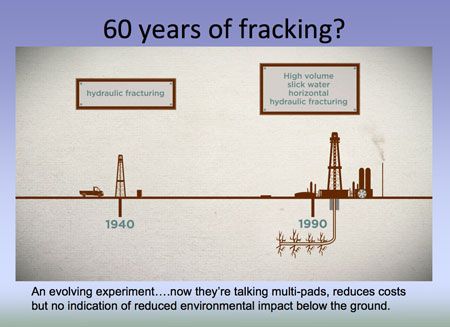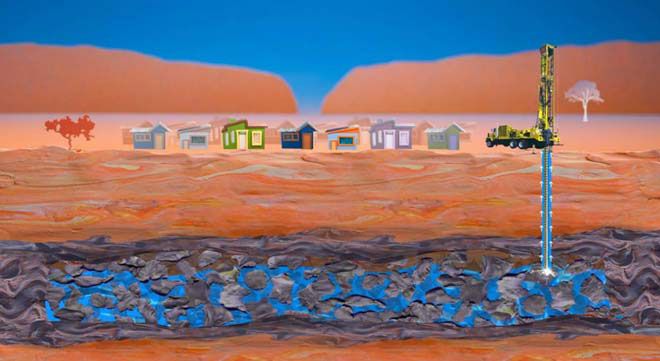Fracking – what guarantees for Alice water supply?
16 September 2014
Alice Springs gets its water from underground. What risk could fracking pose? Image: www.alicewatersmart.com.au
By KIERAN FINNANE
The Town Council has been asked to write to the NT Government to ask for a guarantee that the existing Alice Springs water supply is protected from shale gas exploration in the region. Such a guarantee should include an outline of the evidence on which it is based.
 The request came from director of the Arid Lands Environment Centre (ALEC), Jimmy Cocking, who spoke to council last night on the controversial issue of fracking – the method by which shale gas is extracted.
The request came from director of the Arid Lands Environment Centre (ALEC), Jimmy Cocking, who spoke to council last night on the controversial issue of fracking – the method by which shale gas is extracted.
Council, which heard recently the case for fracking from the resources company Santos, wants to hear from an independent scientist before making up their mind on the request.
The thrust of Mr Cocking’s presentation is that the community does not know the answers to important questions, chief among them “How close is too close?”. The proposed Dingo Gasfield is within 50 kilometres of the town, he said. Is that a safe distance? Rocky Hill, a possible future source of water for the town, is even closer to Dingo: “How much risk are we prepared to take?”
Other questions from Mr Cocking: Do we want an industrialised landscape? Do we want to live with fugitive emissions and flaring? What will be the impact of rising salt and flowback water in big rain events? Do we want to live with a cocktail of chemicals persisting underground where our water comes from? Do we want to live with the risk of leaks, which no amount of engineering could ever entirely eliminate?
 He pointed out that mining, gas and petroleum activities are exempted from the Water Act and are not included in water planning activities. And this comes in the context of the Alice Springs Water Allocation Plan being redrafted, with a likely reduction of the consumptive life of the aquifer from 320 years to 200 years.
He pointed out that mining, gas and petroleum activities are exempted from the Water Act and are not included in water planning activities. And this comes in the context of the Alice Springs Water Allocation Plan being redrafted, with a likely reduction of the consumptive life of the aquifer from 320 years to 200 years.
Right: Deeper, horizontal fracking has only been around since the 1990s. Image from Mr Cocking’s presentation.
He provided councillors with a long list of chemicals used in the fracking process, 650 of which contain hazardous substances. The process also uses between eight and 40ML of water per frack, that is between three and 16 Olympic-size pools, he said.
Council would not be alone in acting, he said: almost 50 other councils around Australia have expressed concern about or opposition to fracking.
If councillors wanted more information, her urged them to google ‘fraCKing’, not ‘fraCCing’, which yields very different results. He also said some of the best information on the process can be found in the submissions to the NT’s Hydraulic Fracturing Inquiry. ALEC and others have called for a moratorium on all exploration licence approvals until the findings of the inquiry are presented publicly.
Discussion of Mr Cocking’s request came at the end of the meeting, by which time he had left the chamber.
Councillor Eli Melky thought it was a “no brainer” to support it. Drilling has to go through the water table to get to the gas: “That’s problematic” in his view.
Cr Steve Brown was vehemently opposed to the request, going so far as to describe it as “mischief making” and suggesting that ALEC is just trying to “get in the face” of the NT Government because of the cuts to its funding.
Cr Jade Kudrenko rejected that view and said it should not be the view of council. She said a large number of people in Alice Springs are concerned about the issue and that she has not been reassured by the information she has heard thus far.
Mayor Damien Ryan pushed for hearing from an independent scientist. Cr Brendan Heenan suggested that Dr Bill Freeland, chair of the NT’s Environment Protection Authority, could provide this.
Officers will try to organise a scientist to make a presentation at the October round of committee meetings.




The geology of our region now appears to be far less productive for oil and gas recovery than was thought just 3 months ago.
Santos have now pulled out of their deal with Central Petroleum to proceed with exploration over a large area due to poor seismic results.
Central Petroleum’s oil strike at Surprise 1 has been significantly downgraded and is now producing less than 200 barrels a day and is in steady decline. That well alone cost $14m.
The Georgina basin to our north is now the focus.
The problem for central Australia is that a lot of gas needs to be found to justify pipeline expenditure to ship the gas where it is needed.
Meanwhile the fracking boom in the USA is swamping the market and driving prices down.
Unless new seismics show unexpected promise central Australia is likely to be all but abandoned by the explorers.
I would highly recommend Cr Steve Brown to leave his politics to do with ALEC out of this particular situation, as I, along with hundreds of residents in Alice Springs are deeply concerned about fracking.
Fracking is one of the most frightening processes going on on the planet, if you do ANY research any where else in the world, under coal seam gas and unconventional fracturing techniques you will see massive amounts of opposition, concern, destruction and irreversible damage down to underground water systems as well as local communities.
There are campaigns in the States run by the likes of Sean Lennon and Yoko Ono with many other celebrities who have helped spread awareness of the process and dissent. http://www.youtube.com/watch?v=VfymhAEe-TM
I don’t think it really suits Alice Springs desert style or morale to turn this beautiful landscape into a gas field. More importantly, I want to be a proud resident of Alice Springs who didn’t mess up water for the future generations.
I won’t be someone who sat back and watched people making decisions which lead to further local environmental destruction for the benefit of a large mining company and a government more interested in figures that futures, who can’t provide environmental assessments or be honest with the public, traditional people, or anyone else who is extremely concerned.
I am not the only one, there are HUNDREDS probably thousands if locals knew what fracking was or what the plans were in the Northern Territory.
We aren’t here for ourselves, we are also here to look after this place for those who are yet to come. Please be very careful and do your research on this one. Poisoning water isn’t something to be proud of.
Jess, it’s not my politics to do with Arid Lands rather it was about Arid Lands attempting to use fears like your own to justify their arguments for further funding.
Their attempts are indeed mischievous because in their presentation to Council they conveniently forget to mention many of the assurances of which they are very much aware, that our own regulatory bodies within the NT Government are able to give us.
What Arid Lands are doing is fear mongering, for a Political Interest, their own survival! Why should that be in question?
Because government and community are a wake up to them, they are simply professional agitators, they are a parasitic NGO that inserts itself in the funding stream and lives of our taxes, adding to the nation’s overheads while contributing a big fat zero to our economy!
Now, of course you are right to be concerned about fracking, but shouldn’t that concern be around asking our regulatory authorities to regulate and monitor all undertakings in this area?
Guess what Jess, they are and they do! Myself along with many others, including Arid Lands, have recently been given a very reassuring update on just what is going on and what that means to us, our water supply, and our environment.
For instance you mention your concern at coal seam gas fracking, did Arid Lands forget to tell you?
There is no coal seam gas fracking going on in the Territory!
And if there was I would also be very concerned about it, and acting on that concern. The kind of gas extraction we are doing and have been doing for many years takes place thousands of meters deeper than coal seam gas extraction, and thousands of meters deeper than the water table.
The horizontal drilling that now takes place means many less penetrations through the water bearing aquifers than would have once been required.
As a result it posses considerably less risk than the drilling of many vertical holes to extract the same amount of gas.
To summarise, does the fracking taking place in the Territory pose a risk? Yes, it does, like just about any other human activity there are dangers associated with it. To minimize these we have appropriate regulatory and monitoring authorities.
We also have economics as a monitor, because with these holes costing up to $20m it is in everybody’s interest – particularly the gas companies’ – to construct them very carefully indeed!
The concept that there are cowboys running about recklessly drilling these holes is plain dumb!
Most importantly, and why I was objecting to the Arid Lands presentation on Monday night, is because it was deliberately creating a community perception that the town’s water supply was somehow in danger. It is not. No-one is drilling near it. And if there is ever an intention to undertake anything so dangerous to our town’s future I most certainly will be demanding assurances from our government!
In the meantime I will not be part of a political fear mongering exercise on the part of Arid Lands. I believe our government was right to cut their funding, the environment is everybody’s responsibility, concerns about it should be taken up with the appropriate authorities not with a bunch of professional activists who wear the mantle of environmentalism as if it were somehow their sole right.
I believe these groups give environmental activision a bad name. It is never in their interest to give you the good news stories that might call into question the necessity of their existence, so their operational theme becomes one of constant doom, overstatement, fear and conspiracy mongering.
As a result it is absolutely my goal to see them de-funded entirely. If these people are so concerned about the environment they can deal with those issues in their own time, just like everybody else! So no Jess, you will not see my signature on any document sent from Council to the NT Government that either supports the Arid Lands argument or their continued operation.
I am, however, very willing to put my name to any document that calls for the de-funding of professional agitators who act like a millstone around the proverbial neck of our community.
ALEC categorically rejects Steve Brown’s defaming of ALEC in his comment below.
ALEC has and continues to make significant contributions to both the economy and social fabric of Alice Springs.
Our vision of ‘healthy futures for arid lands and people’ informs all of our work from Alice Solar City and Alice Water Smart, to the Alice Springs Community Garden, to the Education for Sustainability Network and the EcoFair, to Food for Alice, Biodiversity Matters, advocacy on nukes and fracking and the commercial oriented Arid Edge Environmental Services.
ALEC is a regional and national leader in many ways and hopes to continue despite the current government’s lack of recognition and understanding of the important work we do.
ALEC will not be diminished by your vitriol.
Our vision is a bright one and an inclusive one. Fracking is a dangerous and dirty way of extracting fossil fuels.
The future is renewables and out here, solar … there are no two ways about it. It’s time to leave the 19th century thinking behind and move into the 21st – where innovation is about resource efficiency and productivity, not dirty spin and divisive politics.